You Should Know These People_Bill Walsh
Another post in a series of creative people who have inspired me, who I believe will inspire you.
When Bill Walsh took over the San Francisco 49ers in 1979, they were a dumpster fire – a 2-14 team with no direction, no identity, and seemingly no hope.
The situation was so dire that Walsh later admitted he considered quitting after his first season.
But within three years, they won the Super Bowl. And by the time he retired a decade later, the 49ers had become a dynasty with three Super Bowl victories and six NFC West titles.
But that's just what shows up in the record books. The real story is far more fascinating.
Bill Walsh (November 30, 1931 - July 30, 2007) was a legendary American football coach who revolutionized the sport with his innovative strategies and leadership.
Walsh's journey to disrupting football began early in his career when he was an assistant coach with the Cincinnati Bengals. Faced with a quarterback, Virgil Carter, who had a weak arm, Walsh did something unprecedented. Instead of trying to force Carter into the traditional power-run, deep-passing game, he created something entirely new: the West Coast Offense.
This system turned conventional football wisdom on its helmet.
Instead of establishing the run to set up deep passes, Walsh's offense used short, precisely timed passes that effectively functioned as extended handoffs. These throws, combined with exact routes and timing, created a methodology that was more chess than brute force.
Brains working with brawn became a hallmark of Walsh’s style.
But before all the trophies, glory and accolades, there was disappointment.
In 1975, Walsh was passed over for the head coaching job in Cincinnati.
He was devastated.
Yet, it was in the wake of that disaster that he brought all of his theories to life.
Soon after stints at the San Diego Chargers and Stanford University, Walsh became Head Coach of the hapless 49ers and San Francisco became his laboratory.
You see, Walsh wasn't just drawing up clever plays. He was creating a complete organizational philosophy. He called it the "Standard of Performance," and it touched every aspect of the organization.
Meetings started exactly on time.
Players wore their uniforms exactly the same way.
The practice facility was kept immaculate.
Even the front office staff had to maintain specific standards of professionalism and execution.
His approach to talent, particularly at quarterback, was equally revolutionary. While other teams obsessed over arm strength and physical tools, Walsh looked for something different: processing speed and decision-making ability. This led him to Joe Montana, who wasn't the biggest, strongest, or fastest, but could process information at lightning speed and make the right decisions under pressure.
Walsh's preparation methods were equally innovative. He famously scripted the first 25 plays of every game. This wasn't just about strategy – it was about removing uncertainty and allowing his team to execute with confidence from the opening whistle. His practices were precisely choreographed, with every minute planned and every scenario rehearsed.
Perhaps most importantly, Walsh built a coaching tree that changed football forever. Mike Holmgren, Mike Shanahan (Kyle Shanahan’s father) and Jon Gruden – all branches of the Walsh tree.
Oh, you know who else is part of the Walsh tree? Andy Reid. The man at the helm of the 2-Time (maybe 3-time) Super Bowl-winning Kansas City Chiefs.
But now back to the root of the tree — Bill Walsh. His success lies in the fact that he didn't just create a system; he created a philosophy about football and organizational excellence that could be taught and replicated.
So why should you know him?
Because Walsh's principles transcend football and speak directly to the challenges facing modern organizations. In today's fast and fractured business environment, his lessons are more relevant than ever:
First, true innovation often comes from constraints. Walsh didn't have a strong-armed quarterback, so he created a revolutionary offense. Today's most successful companies often emerge from similar limitations, finding creative solutions to overcome the things holding them back.
Second, systems can maximize talent. The West Coast Offense worked with different quarterbacks because the system was sound. Today's successful organizations build scalable systems that don't depend on individual stars.
Third, details create culture. Walsh's Standard of Performance wasn't about football – it was about excellence in everything.
Fourth, with respect to talent, look for cognitive ability, not just skills. Walsh's focus on decision-making speed and accuracy in quarterbacks mirrors today's emphasis on cognitive ability and adaptability in leadership roles.
Last bit: process is your friend. create a way of doing things that can be taught and replicated. Walsh's success multiplied through his coaching tree, just as today's successful organizations need scalable, teachable systems.
A lot of coaches can win football games, but Walsh took it a step further. he created a blueprint for organizational excellence that remains relevant decades later.
In an era of rapid change and disruption, his principles about innovation, systematic thinking, and organizational culture offer a masterclass in building and sustaining success.
Not bad for the guy who couldn’t get that Cincinnati job.

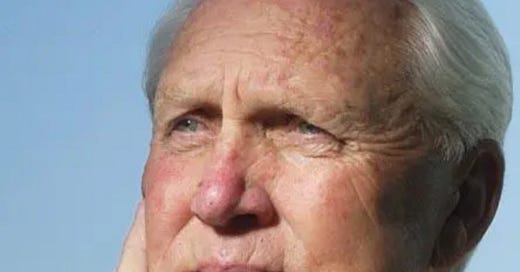





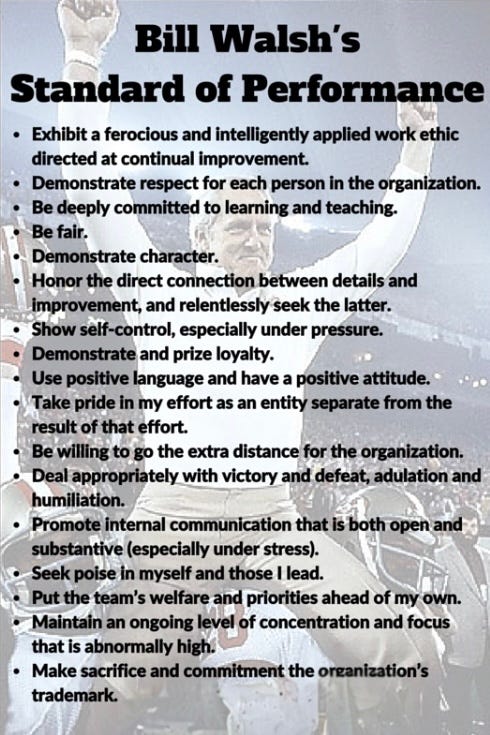
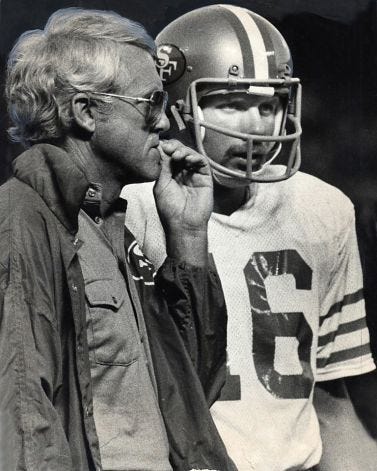
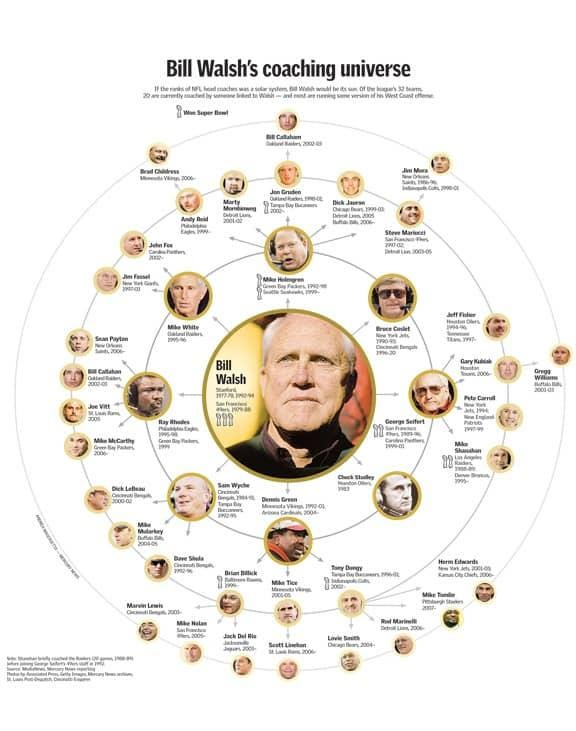
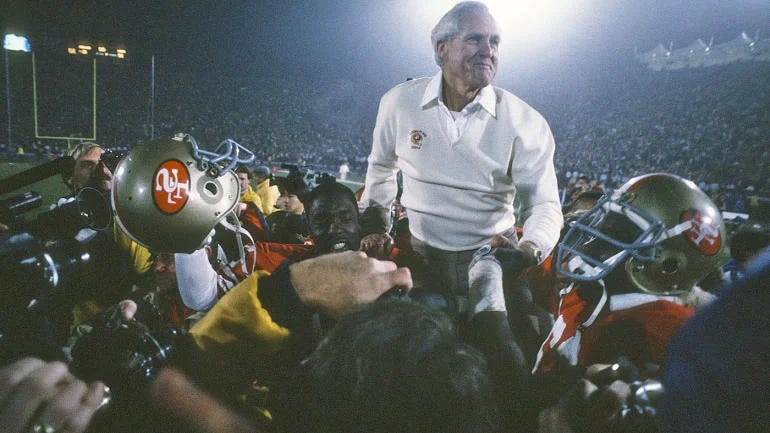
What, what a great story. I did not know this about him.
Also, great close.
Great little article. I remember the 49er’s. I hate to date myself, but remember when football was played with a much bigger and more spherical ball made of big patches of mismatching pigskin, and each team fielded 12,000 offensive players at a time, and the whole defense was just two players in a horizontal trench dug behind the goal line, with a field machine gun and machetes for close combat (ie. fourth and goal from the six.) It was a different game. High scores. Pre-Superbowl IV at Yrpres: Allies -17,682, Axis -19,956. And that was just halftime.